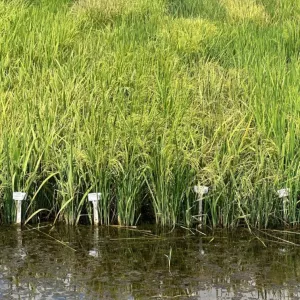A Quarter Century Since the SUB1A Gene: New Flood-Tolerant Rice and Feeding Millions
By Waseem Hussain, Mahender Anumalla, Margaret Catolos, Joie Ramos, Ma Teresa Sta. Cruz, and Myrtel Valenzuela In a landmark study published in The Plant Genome, IRRI scientists unveiled a next-generation flood-tolerant rice germplasm that outperforms current SUB1A varieties by 40–50% in submergence tolerance. This germplasm also exhibits high stagnant flooding tolerance, a trait lacking in SUB1A varieties. Floods Threaten Asia’s Rice Bowl—And SUB1A Alone Isn’t Enough

A Quarter Century Since the SUB1A Gene: New Flood-Tolerant Rice and Feeding Millions
By Waseem Hussain, Mahender Anumalla, Margaret Catolos, Joie Ramos, Ma Teresa Sta. Cruz, and Myrtel Valenzuela
In a landmark study published in The Plant Genome, IRRI scientists unveiled a next-generation flood-tolerant rice germplasm that outperforms current SUB1A varieties by 40–50% in submergence tolerance. This germplasm also exhibits high stagnant flooding tolerance, a trait lacking in SUB1A varieties.
Floods Threaten Asia’s Rice Bowl—And SUB1A Alone Isn’t Enough Anymore
Each year, 21 million hectares of rice fields across Asia are exposed to flooding, threatening both food security and rural livelihoods. The discovery of the SUB1A gene 25 years ago marked a significant breakthrough, enabling the development of flood-tolerant rice through marker-assisted breeding.
However, progress has since slowed. The SUB1A-based varieties remain limited to short-term submergence (less than 10 days) and are highly sensitive to different flood scenarios. Yields decline sharply when flooding occurs at later growth stages, and adoption has been limited in many regions.
As climate-driven flood patterns become more unpredictable, the need for rice varieties with broader and more durable flood tolerance is increasingly urgent. Moving beyond a single-gene approach is essential to strengthen resilience against both submergence and stagnant flooding.

